Rethinking ways of working in a post-COVID-19 reality


The COVID-19 pandemic brought about unprecedented disruption to personal and professional lives across the globe. According to the International Labour Organisation, “more than four out of five people (81 per cent) in the global workforce of 3.3 billion have been affected by full or partial workplace closures.”1
Companies around the world have responded rapidly, taking swift action to safeguard the health and safety of employees and move to a completely new, mostly virtual, way of working. In our survey2 of over 200 mid-corporates, the vast majority (65 per cent) of respondents highlighted workplace safety as their major concern.
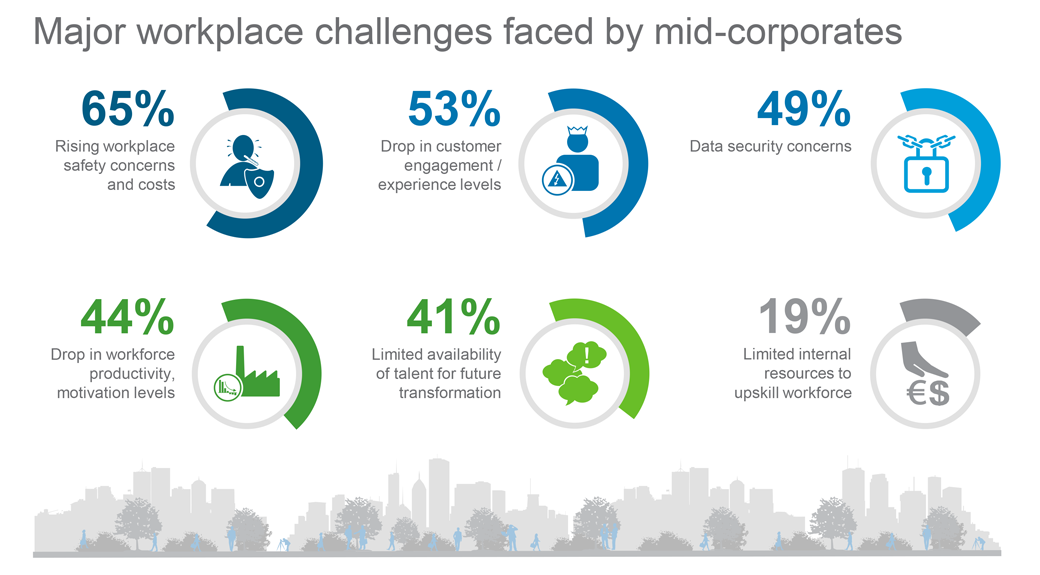
Companies’ rapid response has not only demonstrated the human capability to quickly and successfully adapt the way we approach work, but also shown how work is an activity, and not a place. This new mind-set has helped reduce the stigma around remote working, giving organisations worldwide the opportunity to rethink long-established notions regarding the role of the office, and how work can (or should) be carried out.
As countries emerge from lockdowns, mid-corporates are moving beyond the initial ‘reactive response’ phase and focusing on the next set of workforce challenges as they enter the second and third stages of the ‘Road to Resilient Growth’ (‘Preservation and Stability’ and ‘Prepare for Growth’). While doing do so, it is critical that companies do not fall into the trap of defaulting to former behaviours and routines.
The corporate world is faced with a unique opportunity to completely reinvent its approach to work and must use lessons from this initial experience to strengthen their operating models for the long-term. This is especially relevant for mid-corporates, which inherently have greater flexibility to adapt as compared to large multinational companies.
There is no one-size-fits-all solution for the future of work, and this point-of-view highlights some of the key actions mid-corporates can take to find optimal new ways of working in the evolving post-COVID-19 reality. This includes restructuring their workforces, reconfiguring their workplaces and embedding these changes into their organisational culture. Mid-corporates who manage to align their new workforce culture with their organisational strategy and purpose will undoubtedly be better positioned to thrive in a post-COVID-19 world.
Our survey2 indicated various initiatives that mid-corporates are already considering, with deployment of technology and reassessing human resources (HR) policies and incentive plans being top of the list. Overall, these can be categorised into three areas that mid-corporates ought to consider when adopting new ways of working:
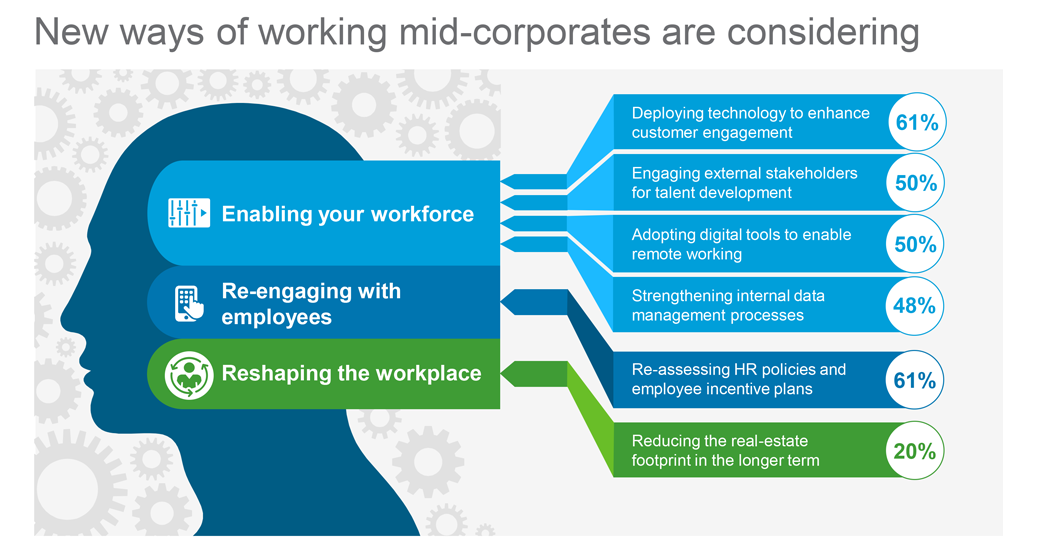
As a starting point, it is essential that mid-corporates enable their workforce by providing the right means for employees to carry on working productively and eventually perform better in a post-COVID-19 world. This includes the following actions:
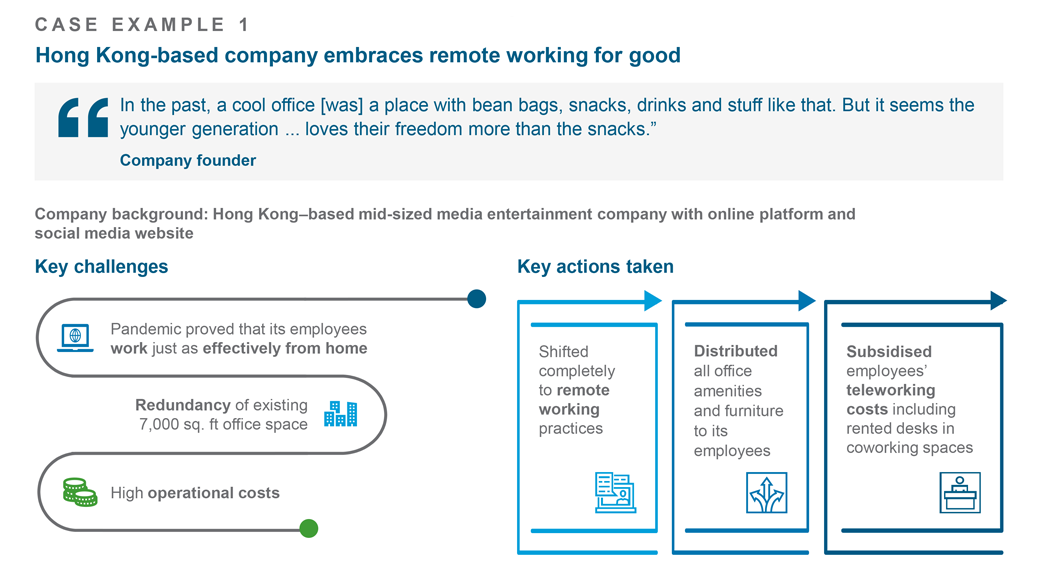
The pervasive uncertainty created by this pandemic has brought to the surface a more human side of employees and employers alike as they experience a range of fluctuating emotions. Traits such as empathy, support, kindness, gratitude, and transparency have been observed across all levels of organisations. By acknowledging and encouraging the values and behaviours that foster better interpersonal relationships and making these part of their corporate cultures, mid-corporates can create workplaces that are more conducive to enhanced employee satisfaction and productivity.
To re-engage with employees, mid-corporates can:
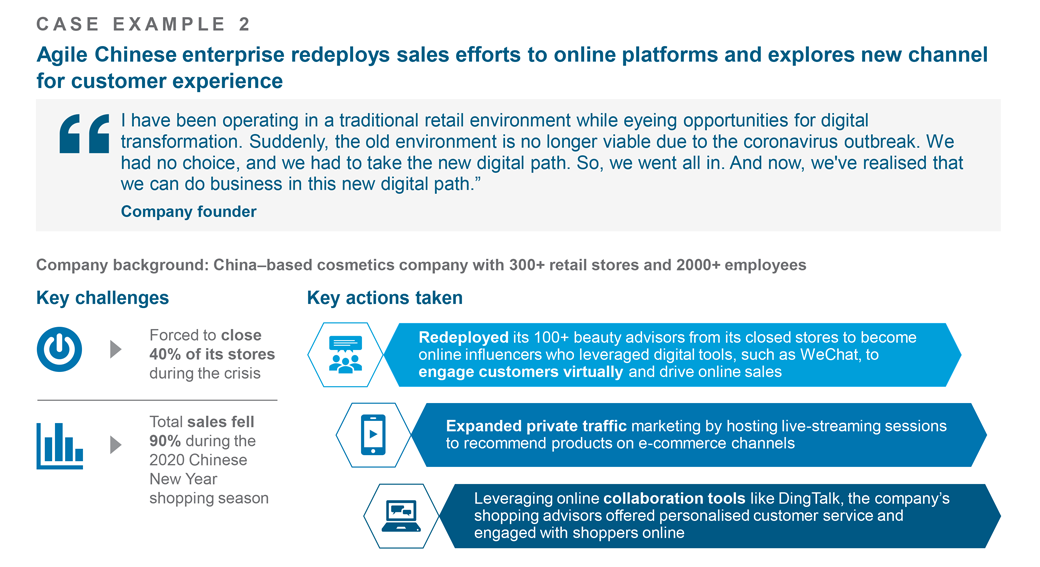
As the COVID-19 pandemic evolves, mid-corporates should consider reshaping the work environment to, first and foremost, ensure compliance with regulatory requirements and guidelines, and secondly, to align with the changing needs of their employees both in the immediate and the longer term. In this undertaking, mid-corporates will need to:
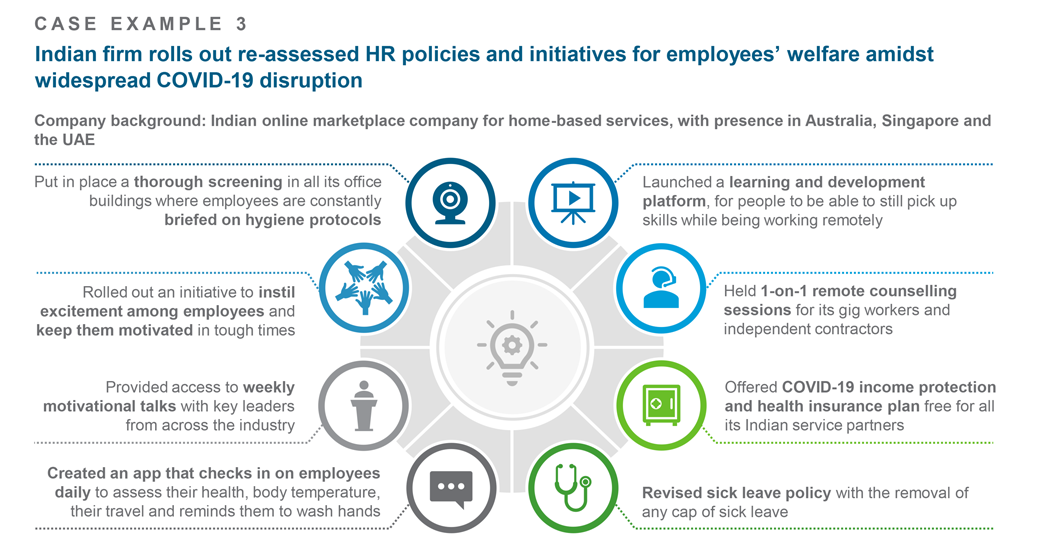
Mid-corporates need to recognise that a resilient workforce is the bedrock of resilient growth. The ability to adapt by incorporating new ways of working is an essential element of resilience building. And a collaborative, dynamic and connected working environment – where employee productivity and well-being go hand-in-hand – will give workers a sense of purpose and the space to thrive going forward.
Our next point-of-view in the ‘Road to Resilient Growth’ series will take a more in-depth look at how mid-corporates can drive efficiencies via digitalisation across their operations and go-to-market activities to build further resilience and succeed in a post-COVID-19 world.
1 International Labour Organization, ‘COVID-19 causes devastating losses in working hours and employment’
2 Survey commissioned by Standard Chartered in June 2020 and completed by 205 mid-corporates (annual revenue USD100m-500m) based in Mainland China, Hong Kong, Singapore, Malaysia and India.
Watch now
[iframe title=”Video” width=”800″ height=”450″ scrolling=”no” marginheight=”0″ marginwidth=”0″ src=”https://www.youtube.com/embed/BtBaPH3Pcl0?showinfo=0&rel=0″]
International Labour Organization, ‘COVID-19 causes devastating losses in working hours and employment’, April 2020
Forbes, ‘As We Emerge From Lockdown, It’s Clearer Than Ever That Work Is An Activity, Not A Place’, May 2020
PwC, ‘Reboot: Getting back to the workplace’
PwC, ‘COVID-19: Workforce considerations’
PwC, ‘Protecting people and productivity in times of crisis’
Strategy+Business, ‘Getting back to the future…of work’, July 2020
World Economic Forum, ‘This is how COVID-19 could change the world of work for good’, April 2020
Channel News Asia, ‘Commentary: COVID-19 is reshaping what work looks like’, April 2020
This material has been prepared by PricewaterhouseCoopers Consulting (Singapore) Pte Ltd. (“PwC”) at the request of Standard Chartered PLC and its affiliates (“SC Group”) in accordance with the agreement between PwC and SC Group. Other than to SC Group, PwC will not assume any duty of care to any third party for any consequence of acting or refraining to act, in reliance on the information contained in this report or for any decision based on it. PwC accepts no responsibility or liability for any use of this report by any third party, including any partial reproduction or extraction of this content.
It is not independent research material. This material has been produced for information and discussion purposes only and does not constitute advice or an invitation or recommendation to enter into any transaction or to subscribe for or purchase any products or services and should therefore not be relied upon as such. It is not directed at Retail Clients in the European Economic Area as defined by Directive 2004/39/EC, neither has it been prepared in accordance with legal requirements designed to promote the independence of investment research and is not subject to any prohibition on dealing ahead of the dissemination of investment research. The information herein may not be applicable or suitable to the specific investment objectives, financial situation or particular needs of recipients and should not be used in substitution for the exercise of independent judgment.
Some of the information appearing herein may have been obtained from public sources and while PwC and SC Group believe such information to be reliable, it has not been independently verified by PwC or SC Group. Information contained herein is subject to change without notice. Neither PwC nor SC Group is under any obligation to update or revise the information contained herein. Any opinions or views of PwC or SC Group or any other third parties expressed in this material are those of the parties identified. PwC and SC Group do not provide financial, accounting, legal, regulatory or tax advice. This material does not provide any investment or tax advice. Please note that (i) any discussion of U.S. tax matters contained in this material (including any attachments) cannot be used by you for the purpose of avoiding tax penalties; (ii) this communication was written to support the promotion or marketing of the matters addressed herein; and (iii) you should seek advice based on your particular circumstances from an independent tax advisor.
While all reasonable care has been taken in preparing this material, PwC, SC Group and each of their affiliates make no representation or warranty as to its accuracy or completeness, and no responsibility or liability is accepted for any errors of fact, omission or for any opinion expressed herein. You are advised to exercise your own independent judgment (with the advice of your professional advisers as necessary) with respect to the risks and consequences of any matter contained herein. PwC, SC Group and each of their affiliates expressly disclaim any liability and responsibility for any damage or losses (including, without limitation, any indirect or consequential losses or damages) you may suffer from your use of or reliance on this material or as a result of any information being incorrect or omitted from this material.
Any financial projections or models included in this material are based on numerous assumptions regarding the present and future business strategy of the entities to which such projections or models relate and the environment in which such entities may operate in the future. These future events are not a guarantee of future performance and are subject to certain risks, uncertainties and assumptions.
SC Group or its affiliates may not have the necessary licenses to provide services or offer products in all countries or such provision of services or offering of products may be subject to the regulatory requirements of each jurisdiction. This material is not for distribution to any person to which, or any jurisdiction in which, its distribution would be prohibited.
The SC Group may be involved in transactions and services with clients or other persons who are, or may be, involved in the transactions that are referred to in this material or who may have conflicting interests with you or any other person. The SC Group’s ability to enter into any transaction (or to provide any person with any services) will be subject to, among other things, internal approvals and conflicts clearance.
The distribution of this material in certain jurisdictions may be restricted by law and therefore persons who receive this document or any Information should inform themselves about, and observe, any such restrictions. Any failure to comply with these restrictions may constitute a violation of the laws of any such jurisdiction. No liability to any person is accepted by SC Group or PwC in relation to the distribution of this document or the Information in such jurisdictions.
The distribution of this material in any other country locations may require suitable disclosures to be made by the SC Group. Should you receive this material in such other country location, please contact the relevant SC Group member.
Copyright in this document and all materials, text, articles and information contained herein is the property of SC Group or its licensors (save for any copyright in materials created by any identified third parties which remain vested with the respective third party), and may not be copied, distributed, adapted, translated or otherwise used (in whole or in part) without the prior written consent of SC Group.
Copyright © 2020. SC Group. All rights reserved.